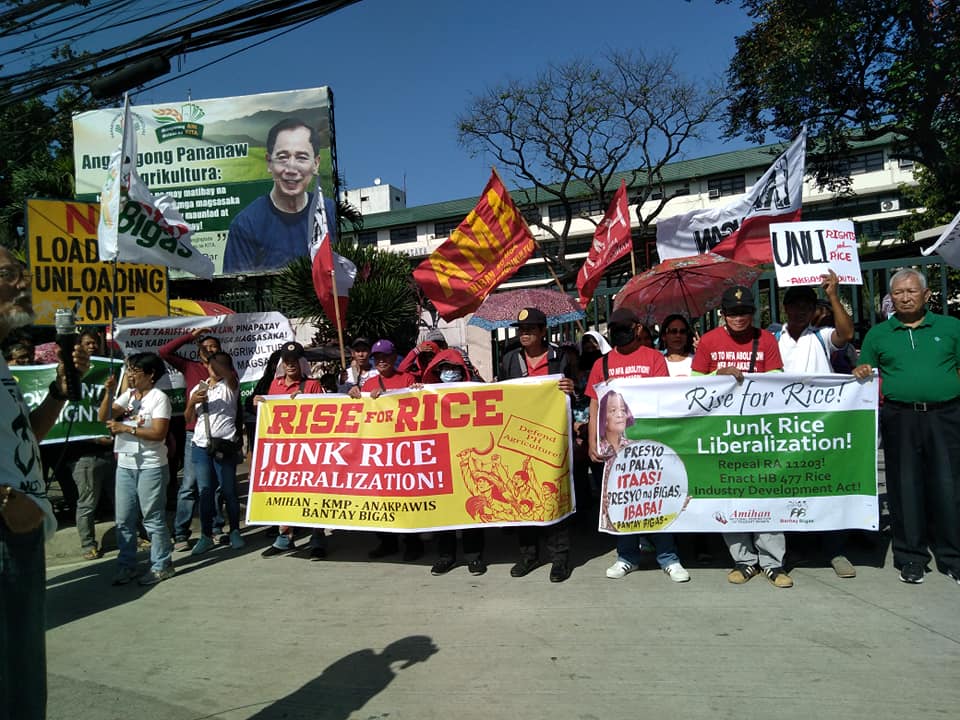Manila, Philippines – The Bantay Bigas rice watch group, Amihan National Federation of Peasant Women and Anakpawis Party-list announced that Filipino rice farmers lost at least P74.8 billion due to depressed farm gates which the groups blamed on the implementation of the Republic Act 11203 or Rice Liberalization Law.
“It has been a trend, since the country joined the World Trade Organization in 1995, when there was even the slightest buzz of arrival of imported rice, farm gate prices at the barrios are forced down by traders, throwing farmers into bankruptcy and indebtedness. It is worse now, because it was institutionalized by RA 11203. This is the anti-peasant legacy of the Duterte regime,” Rafael Mariano, former Anakpawis Party-list lawmaker said in a press statement.
Anakpawis staunchly opposed the law when it was still being deliberated at the lower house and as alternative primarily pushed for the Rice Industry Development Act (RIDA) bill during the 17th congress. The bill, now House Bill 477 being pushed by Gabriela Women’s Party Rep. Arlene Brosas, proposes the authentic development program for the national rice industry, involving the three-year allocation of P495 billion, which includes P185 billion for its core programs and P310 billion for the procurement program of the NFA.
Moreover, Bantay Bigas blamed the law for the rice farmers’ losses, as exposed by government data:
· 2018 value of production of palay at P385 billion for the volume of production of a little more than 19 million metric tons, or P20.19 per kilogram average value or farm gate price;
· 2019 value of production of palay at P305 billion for the volume of production of a little more than 18.8 million metric tons, or P16.22 per kilogram or decline of about P4;
· 2019 volume of production of palay if previous value per kg was maintained, value would have been P380 billion, thus, potential losses due to depressed farm gate prices would be at P74.8 billion.
“We have been warning against this even before the enactment of the law, but Duterte chose to favor the rich oligarchs who dominate rice importation and trade. He is ruling against the interest of poor Filipino rice farmers. Thus, we call on all stakeholders to join the call of repealing the law,” Cathy Estavillo, spokesperson of Bantay Bigas and Secretary-General of Amihan elaborated.
Bantay Bigas led the 50,000-signature petition to repeal RA 11203 and it is aiming another batch of 100,000 signatures by March. Estavillo said that the public warmly welcomed the petition drive as opposition to the law and liberalization policies for the rice sector.
The groups said that undermining the rice food security, self-sufficiency and self-reliance, and abandoning the “food on the table” agenda would be an undisputable legacy of the Duterte regime, and the Filipino peasants have engraved this on their consciousness and would never be erased.
“We urge the Filipino people to rise up against rice liberalization, junk the law and uphold the national rice industry, as legacy of the people’s struggle to the next generation Filipinos,” the groups said.
Bantay Bigas and Amihan urged the people to join the” Rise for Rice! Junk Rice Liberalization!” protest this coming February 14 at Mendiola bridge, Manila, marking the laws’ first year implementation. ###

